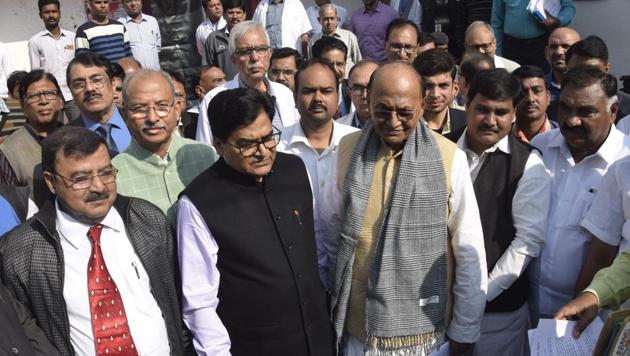The role of Standing Committees in India’s Parliamentary process
Parliamentary Committees are basically miniature parliaments in themselves, comprising members across party lines from both the Houses. But they are so much more
In what could be a sign of things to come, we saw the passing of the controversial Right to Information (RTI) Amendment Bill and the Unlawful Activities (Prevention) Amendment Act Bill amid an Opposition walk-out recently. The reason? The Opposition’s motion to refer the Bills to Parliamentary Committees was voted down. The controversy around the Bill’s provisions aside, what was the Opposition hoping to achieve by referring them to a committee of Parliament which instead could not be debated on the floor of the House?

When it comes to Bills, the Speaker of the Lok Sabha or the Chairman of the Rajya Sabha may refer the Bill to a standing committee or a select committee at her discretion. Parliamentary Committees are basically miniature parliaments in themselves, comprising members across party lines from both the Houses. But they are so much more – committees can call for and examine witnesses, look into the minutiae of an issue, and give detailed recommendations, but most important, they allow a member to speak her mind on an issue without the need to toe the party line. This helps build consensus to resolve deadlocks in legislation. The outcome is usually a report tabled in Parliament having “persuasive” or “advisory” value. Due to the non-binding nature of these reports, it is often possible for the government of the day to ignore the recommendations within the report.
These reports, which can run into several hundred pages, are then of only academic value. The statistics are not on the side of the committees either. As per PRS Legislative Research, in “…the 16th Lok Sabha, 25% of the Bills introduced were referred to Committees, much lower than 71% and 60% in the 15th and 14th Lok Sabha respectively”. A Parliamentary committee not only examines each provision within the Bill extensively, giving each member multiples opportunities to present her detailed views and amendments, but also acts as a check on poorly drafted provisions within legislation which is hurriedly passed through a House. Additionally, given the bipartisan nature of such committees, the government all but co-opts the Oopposition from opposing the Bill once the report has been tabled. Why, then, should a government be reluctant to refer a Bill to a committee?
The most likely reasons would be time and scrutiny. In the cases of bills, it can take months before a report is tabled in Parliament with some bills being referred to committees more than once. Which bring us to the point of scrutiny. When a government lacks the numbers in a House to pass the contentious bill, the committee process helps bring on board support which it would otherwise lack. But where a government has adequate numbers to push through legislation, it might view the committee as superfluous at best, and, perhaps, even a disadvantage, as it allows the Opposition to get its dissent noted on record. But whatever may be the reason, bypassing of committees is a practice which is inimical to parliamentary democracy.
Since their inception, parliamentary committees have witnessed few radical changes. One does not witness the heated debate that is so common on the floor of Houses as the proceedings of committees are usually privileged and not publicly accessible. Department-related Parliamentary Standing Committees, created in 1993, which largely have an audit-based role of their respective ministries are circumscribed in their areas of functioning. When a party has sufficient numbers in both Houses of Parliament, it is almost inevitable that these standing committees are populated by members from the ruling disposition, which enables them to prevent matters unfavourable to the government from being taken up.
The committee process in India can be made more effective and transparent. Committee proceedings are often publicly available or even live-streamed over the internet in some jurisdictions. This would certainly allow the public to play a greater role in the functioning of these committees. Additionally, it would prove to be a check on member absenteeism, a chronic problem when an issue requires quorum. By giving the standing committee the power to ask for bills related to its area of operation to be referred to it, a government which has overwhelming numbers in Parliament will be unable to bypass scrutiny by a committee. While these committees are serviced by able staff, the lack of subject-matter expertise severely hampers the quality of standing committee reports, and by association, the quality of the recommendations in the reports leave much to be desired. By expanding the area of functioning of department-related Parliamentary Standing Committees to include matters of public interest handled by the particular ministry, the committee is not longer bound to act as a yearly financial auditor of accounts, but gives the parliamentarian an active role in the oversight of government functioning.
Arjun Chandrasekhar is a lawyer, and was formerly attached to the chairman, Standing Committee on Home Affairs
The views expressed are personal



